In November 2024, a European delegation visited Ukraine, including MEPs Li Andersson from Finland’s Left Alliance, Jonas Sjöstedt from Sweden’s Left Party, and Catarina Martins from Portugal’s Left Bloc. Their political movements are co-founders of a new political party of the progressive left in the EU — the European Left Alliance for the People and the Planet. Commons has already published an interview with Catarina Martins; now we present the interviews with the other two MEP guests.
One of Finland’s most popular politicians, Li Andersson led her party from 2016 to 2024, ran as its presidential candidate, and served as Minister of Education from 2019 to 2023. She now chairs the European Parliament committee focused on labor and social rights. Jonas Sjöstedt began as a factory worker and became politically engaged early on as an opponent of the Vietnam War. He led his party (2012–2020) too, served for many years in both national and European parliaments, and returned to the latter in 2024. He is also known as a writer.
Both Sjöstedt and Andersson have been leading voices of solidarity with Ukraine among Europe’s democratic socialist forces, advocating for comprehensive support and debt cancellation for the country, as well as tougher sanctions against Russia as the aggressor state — including measures targeting the so-called Russian shadow fleet.
Right-wing governments disappoint and radical left on the rise: a conversation with Li Andersson
Denys Pilash: In the left group of the European Parliament, it is the Nordic eco-socialist parties that take the clearest pro-Ukrainian position. And they were the ones who strengthened the most in the last European elections. In particular, your Left Alliance tripled its result to 17.3%, and you personally set a national record for the number of votes cast for you as a Member of the European Parliament. What explains this? What is your secret?
Li Andersson: I do think it’s important to point out that the French left and also the Portuguese left have also voted in support of Ukraine, even on arms, so it’s not only about the Nordic left parties. We have less discussions on it in the Nordic countries and we also have voted in favor of long range weapons or missiles to be used, so Ukraine could use it on Russian territory. That was clearly more dividing in the rest of the left.
If you look at the Nordic countries – they are not superpowers. People try to make geopolitics only in a balance of superpowers, so it’s all about the US and Russia, you could not really fit other countries into that kind of context or way of analyzing the world, you don’t really give much weight to what Ukrainians or Baltic citizens and the Baltic states want. Coming from smaller Nordic countries, we have the same kind of analysis as the Ukrainian left on what Russian imperialism is and the importance of supporting the ones who are having to fight against it in the worst way imaginable. We also work a lot together, and this cooperation is beneficial. Right at the start of the invasion, when many parties were having a discussion about how to position ourselves on these issues, our positioning was supported by the close cooperation that we have.
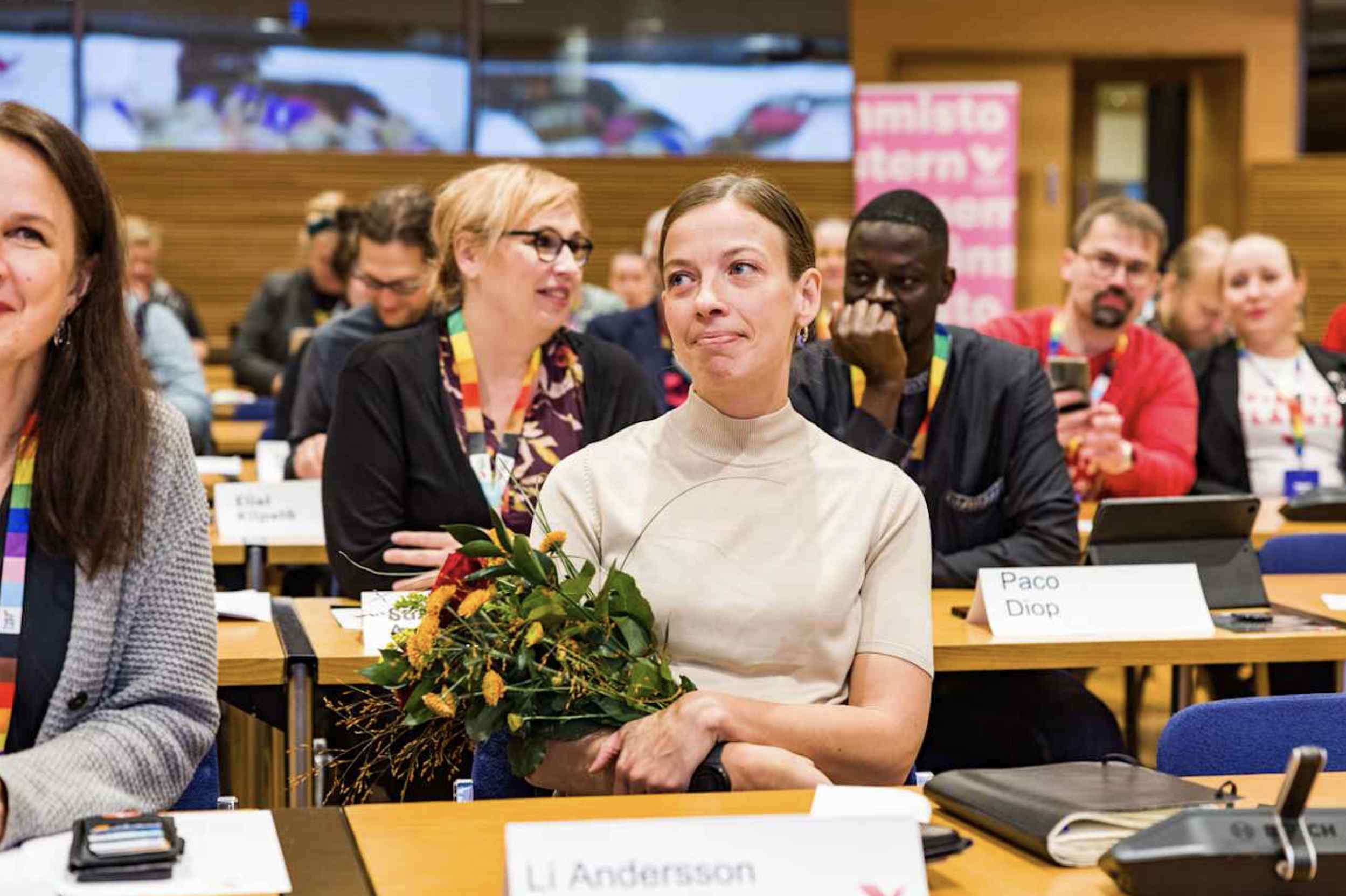
Li Andersson. Photo: Esa Syväkuru / Yle
Some leftists are stuck in a kind of dogmatism of their own tradition. You can hear a lot of this kind of peace rhetoric in the European left that is something people just repeat, because they feel that this rhetoric has always been, it's a part of their identity to speak and think in a certain way. And the danger of this, in the case of Ukraine, is that it actually leads to a political conclusion which does not take into consideration the realities of Ukraine and the fight against Russian imperialism in any way. I know I oversimplify it, but we witness over and over again this kind of logic – “guns are bad, so we oppose them”, or “we don't want a larger war, so we oppose guns, for there to be no escalation”. The Nordic Red Green parties have done a lot of work in modernizing themselves, overstepping this dogmatism and now we have the modern red green analysis of the world and of societies. It is easier for us not to be stuck in a certain dogmatic tradition, at least in this case.
There are two reasons why we have good election results: one that has to do with the work that we have done, and another how bad the work of the far right is. The left in the Nordic countries benefited a lot from having a very logical and consequent line when it comes to international law and human rights. So all of these parties have been very vocal when it comes to Israel's breaches of international law, very clear in our support with the Palestinian people, and very clear when it comes to Russia's breaches of international law, and clear on our solidarity with Ukraine. And this is logical. It's an absolutely logical line of reasoning, if you say you are in favor of international law and human rights, and I think that the voters are. Also, they agreed on our analysis and position on this. And you can see how the right wing in the Nordics are, of course, very anti Russia, and they condemn Russia's violation of international law. When it comes to Israel, they don't do the same. They are not logical in their line of reasoning. And then you see some parts of the left that's very clear on Israel, but not very clear on Russia or Ukraine. The Nordic left has done good work on this.
And of course, in the European election we also talk a lot about climate change, workers rights, having an agenda that combines traditional themes of the left when it comes to the labor market, when it comes to social rights, social services, with an ambitious line on climate and environmental policy.
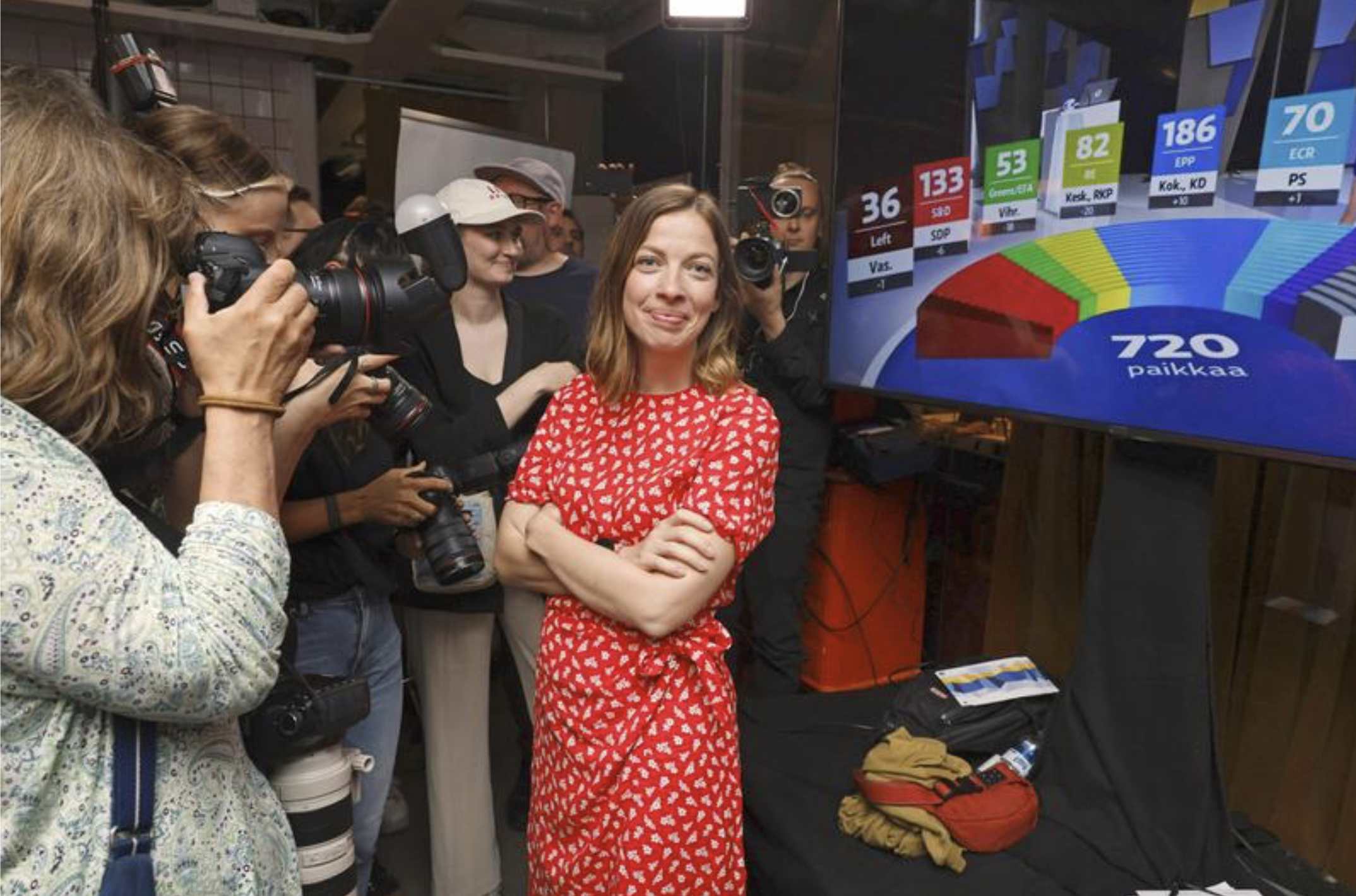
Left Alliance leader Li Andersson, on the evening of the European election results in Helsinki, on June 9, 2024. Photo: RONI REKOMAA / AP / SIPA
Were the results of the European Parliament elections in Northern Europe also affected by voters' disappointment with right-wing governments that pursued anti-social policies?
Yes, the other reason was, as I said, that at the time of the election, Finland and Italy were the only countries in the EU where the far right was in government. In Sweden, they are not in government, but they support the party of the government. So they are almost in government, because they even have offices in the government buildings. They vote for their budgets, but they were not given Minister posts. And in Finland and Sweden, people have seen what kind of politics these parties do when they have power. So in a sad way, we are kind of ahead of the development of Europe. Because, in France, Germany, Austria, Spain, even Portugal and so on you can see far right parties really growing bigger everywhere but we already saw that, and now we see what they actually do when they get into power.
In the Finnish context, this has meant the worst austerity policies this country has seen in modern history. I was party leader for eight years, so I did a lot of different election campaigns, and I've never met so many crying human beings as I did during the European election campaign, because they were so worried about the direction of our own country, and also some were just worried about how they will make ends meet, because there's been really severe cuts in social support, especially for workers with low income, for poor families, and also for unemployed. And on top of that, they have also pushed through labor market reforms. I call them Thatcherite. I think Thatcherism describes the far right in Finland very well. So they have restricted the right to strike. They are going to make it easier to fire people. They are pushing for reforms which will mean that collective bargaining coverage will drop. They are also pushing for reforms which will set a cap on wage increase for public sector workers. In the long run this kind of stuff will make a structural change of the Finnish labor market, which will really harm both the possibilities of the trade unions to defend the workers, but also real wage increase.
And also in Sweden, they have a huge crisis in health care. The government is more interested in giving tax breaks for rich people than giving enough resources for a health care system in crisis. We see a lot of the same, except the labor market policies there, because the trade unions and the employers keep it to themselves, but you see a lot of the same kind of attacks at the public sector, then, of course, combined with restriction on immigration, combined with attacks against public services and a lot of other things. In Finland, they passed an asylum law that was contrary to international law and EU law.
And our main message in the European election was for people to make sure that the same kind of shift of power to the far right won't happen on European level, because we have already seen what it means in Finland. Europe has not. That was a very successful message. Unfortunately, even though the Nordics did well, the rest of the European Left, maybe not so much.
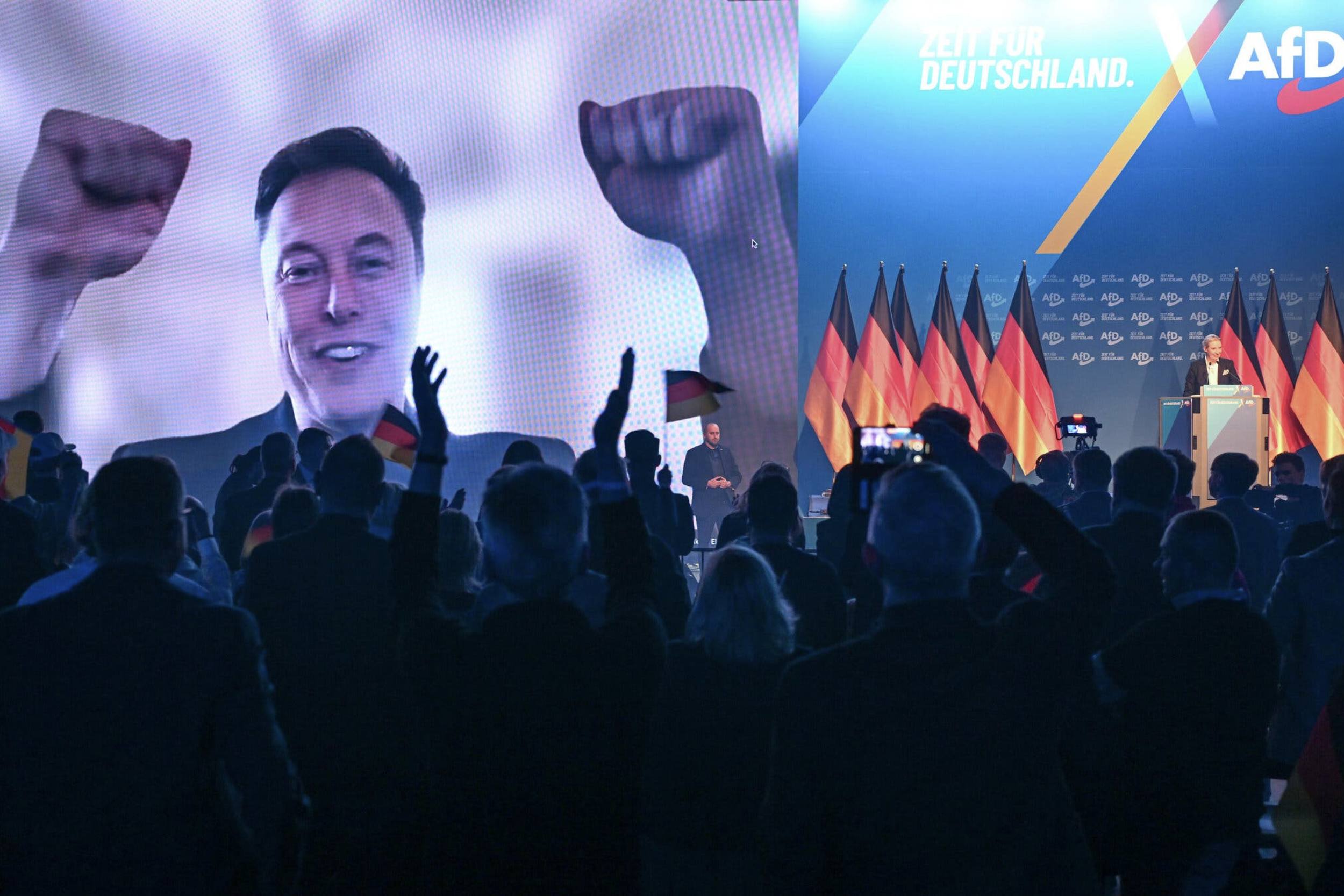
“It’s good to be proud of German culture, German values, and not to lose that in some sort of multiculturalism that dilutes everything,” Elon Musk told a gathering of the hard-right Alternative for Germany party. Photo: Sebastian Willnow / DPA, via Associated Press
So we have now the shift of power to the far right. At the start, it looked like they would not get influence in politics, in the European Parliament, so that the court of the Senator would still be in force. Now, during the last two months, we have seen that this is not the case. So EPP that’s the mainstream right wing are willing to make majorities with the far right and the extreme right. So when it benefits them, they are willing to use this majority to push true laws on a national level as well. The left, we were not surprised that the right wing would do that. But I think in the Social Democrats and the greens and the liberals, they are shocked. And now the big question on the European level, is that, will these groups be willing to form a strategy on how we counter this right wing development, to cut off their force. Are they willing to work with pro democratic European political groups that support Ukraine, or are they actually willing to govern with the support of Meloni and Le Pen and ultimately, of Deutschland, like these kinds of parties and Fidesz that are sitting in the far right groups.
Yeah, so basically, these right wing governments did the same social labor policies that our economic bloc in our own government is also pushing forward. You now chair the European Parliament Committee on Employment and Social Affairs, what can you say about the ways of improving the situation with labor rights both in the EU and Ukraine?
I know there's a big difference in the Nordics. If you look at Denmark and Sweden, the traditional Nordic labor market model is still working there, which means that the government doesn't really interfere that much, but they leave it to the labor market parties to decide for themselves and negotiate and so on. In Finland, this system is already broken. In most European countries, you don't have that kind of Nordic labor market model, so it's more government driven. And the Finnish trade unions used to say that the EU is the workers best friend. Because so far in their point of view, the legislation that has been coming from the EU level has been better than what the national governments, the right wing government, actually say here. They would not say it in Sweden or Denmark, because they still have the power there.
But I think for all of the other countries, this is something to reflect on, because that means for me that there still has been space in European politics for progressive policies when it comes to workers rights. I was coming from this terrible right wing government situation in Finland. I was really positively surprised when I studied in the European Parliament in the committee by how positively the commission was writing about collective bargaining. Even the right wing groups in the committee are kind of in favor of it. So I think we as the left should push on the EU level for as much progressive labor market policy as possible. I think that is one area where it would be difficult for the far right.
And we should also work together with Ukrainian trade unions and social movements. Because for me, I don't know how you feel about this, but for me, this whole discussion and prospect of Ukrainian EU membership is something that we should use to push for improvements in the labor market legislation, use this EU argument that for Ukraine's EU membership to become reality you need to enact labor legislation that gets collective bargaining coverage as high as possible. The EU also does a lot of workers’ health and safety, dangerous substances, regulates the amounts and so on. So I think that there could be a lot of cooperation through that theme for the left working in the European Parliament and for the Ukrainian social movements and trade.
The fight against Russia's shadow fleet is an example of a left-wing policy that combines solidarity with Ukraine and environmentalism: conversation with Jonas Sjöstedt
Denys Pilash: The most recent European Parliament elections were accompanied by discussions of a threatening rightward shift — it seems that the far right, many of whom are also pro-Putin, gained strength almost everywhere in the EU. With one notable exception: the Nordic countries — Finland, Sweden, and Denmark. There, right-wing populists have, on the contrary, lost significant support, while left-wing forces — including Finland’s Left Alliance, Denmark’s Red-Green Alliance and Socialist People’s Party [the Green Left], as well as your own Left Party of Sweden — have made gains. What explains this? A matter of temporary circumstances, the failures of right-wing governments, or the successful strategies of socialists in engaging the electorate? What can left-wing movements elsewhere learn from your experience?
Jonas Sjöstedt: I think the recent election results in the Nordic countries — Finland, Sweden, and also Denmark — show that it's possible to defeat the far right not by adopting their agenda, but by promoting a strong, positive left-wing alternative. We focused on issues like equality, public services, the climate crisis, and international law — both in Ukraine and Gaza. And in doing so, we didn’t allow the far right to dominate the conversation with their favorite topics like migration and crimes.
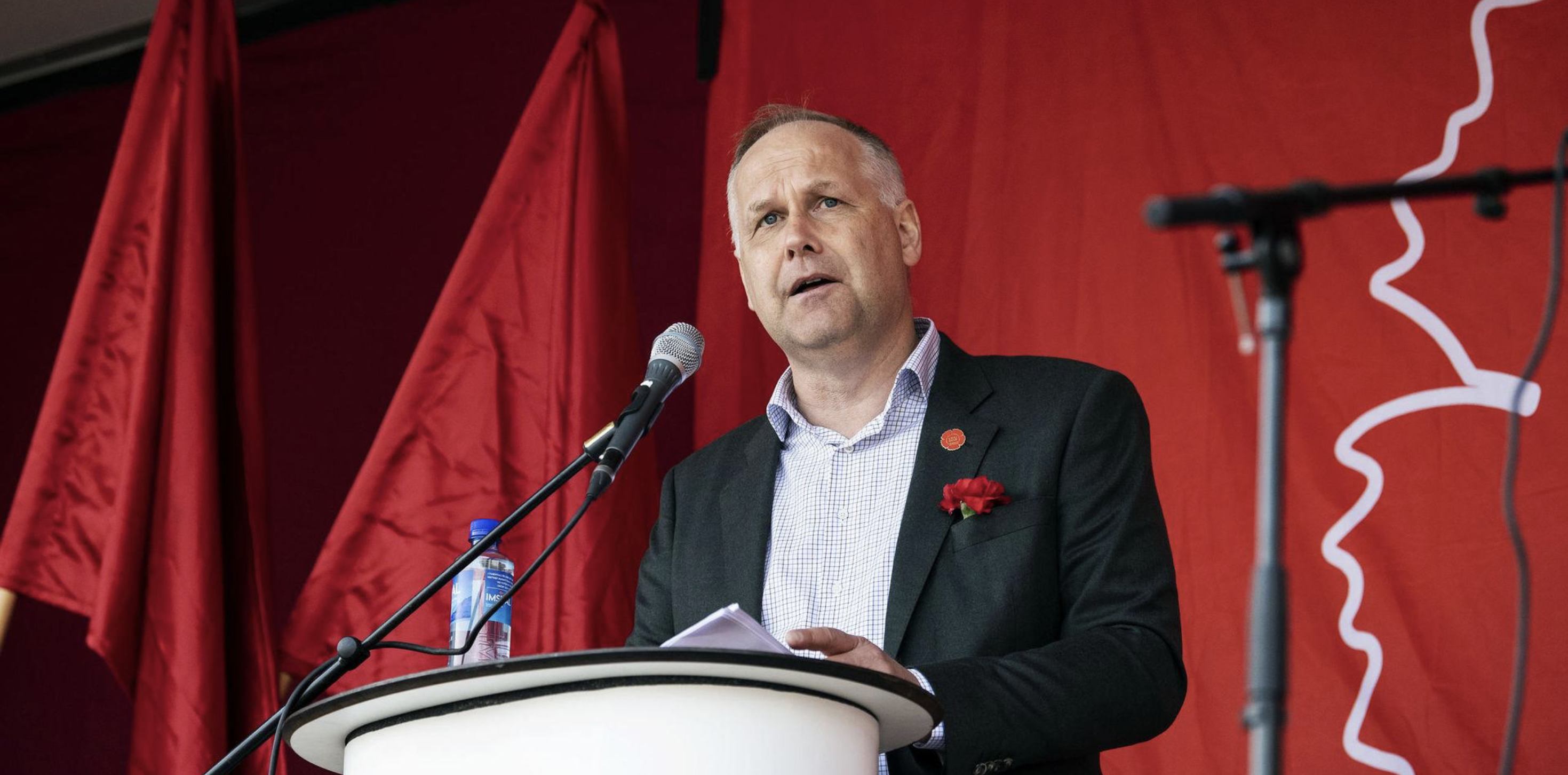
Jonas Sjöstedt speaking at Gustav Adolfs Square in Gothenburg, Sweden, on May 1, 2019. Photo: Anna Tärnhuvud
And I would say that one factor that plays a role is that we have seen the extreme right in power. They are the government in Finland. The Swedish right wing government is totally dependent on them, and they adapt the policies accordingly. And people don’t like what they see. As long as far right stays in opposition, they can cultivate the illusion that they’re on the side of workers, of “ordinary people.” But once in power, it becomes clear: they’re just racist right-wingers with an aggressively pro-business economic agenda. There's not a single trace of progressive economic policies, just lower taxes for the super rich, cutting back on healthcare. These are the same old harsh, raw right-wing policies— anti-union, indifferent to social and environmental issues.
So I think that's a positive message coming from the Nordic countries.We hope that we are a bit ahead of some European countries, and that this can also happen in many others. Denmark’s Socialist People’s Party that belongs to the Greens/EFA group became the largest party in their European elections. We increased more than any other party in the Swedish election, and the election result in Finland was spectacular, with the left triple and just crushing the extreme right.
So yes, I believe there’s a message of hope here — a message that we should trust in our own policies and give people a real sense of possibility. These are really difficult times for many. I know I shouldn't say that in the context of Ukraine, but I mean, it's also economically not the best time in Western Europe — with inflation, the cost of living crisis, and economic uncertainty. And the left has to be present — to say: there is a way out. There’s a better way to do things. That, I think, was the core of our message — and our direction.
So in this context, how do you evaluate the prospects of your new alliance, the European Left Alliance for the People and the Planet (ELA)? Do you see it expanding to other countries, particularly in Central and Eastern Europe?
We saw the need for a closer and more modern European Left-wing cooperation. We think that we should gather parties that are willing to not only hold the best beaches, but also to go in and change policies. And I think the parties that are there also think about how we can actually get political power. We also saw some weaknesses in the previous or the still existing other European left formation – Party of the European Left – with there being a more inward looking, more old fashioned party dominated by more traditional communist parties. We are not.
And I have to say, the issue of Ukraine was — and still is — very important for us. A credible left condemns not only the occupation in Palestine but also the illegal occupation of Ukraine. It’s not complicated: it’s imperialism, it’s aggression, it’s about human rights and respect for international law. And unfortunately, there are still some left-wing parties that struggle with this. For us, it was crucial to form an alliance that was just dominated by what we think is so important – to support Ukraine.
And we, of course, hope that ELA will grow. Right after the European elections, we moved fast to establish it and get it officially accepted. Now we're working with the budget, and of course, in the Swedish Left Party, we would love to see Ukraine’s Social Movement as part of this European cooperation.
There are also some other left-wing parties emerging in Central Europe that are in the CEEGLA network, and we’d be very happy if they decide to join us. We hope this becomes an asset supporting each other, sharing ideas, campaigning together, and learning from one another about how things work in each of our countries. We’re planning a big meeting for all member parties this winter, where we’ll invite others to join.
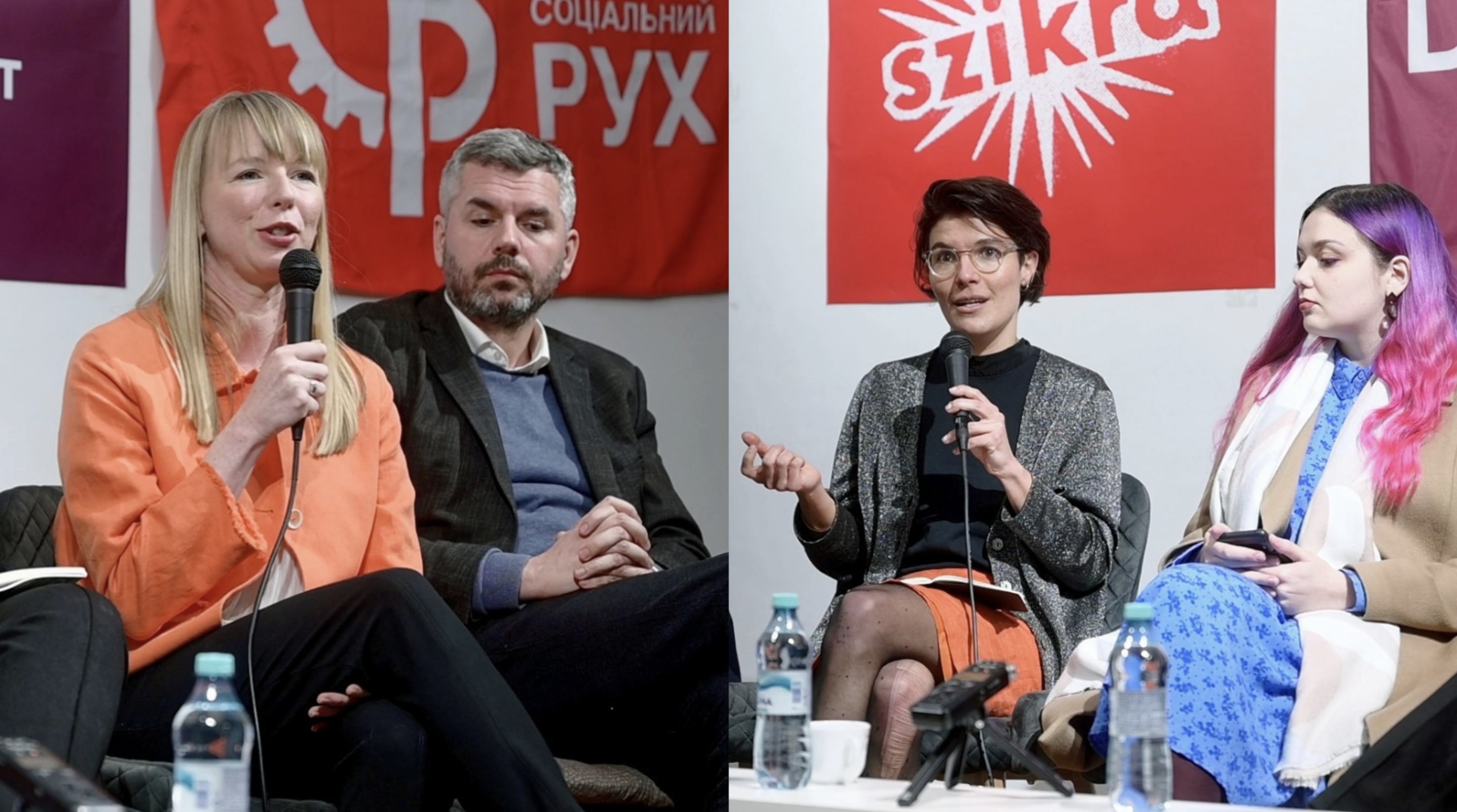
Central Eastern European Green Left Alliance or CEEGLA. Photo: ceegla.org
And you had some cooperation with the Croatian Možemo! (We Can!)?
Yes — they’re a red-green alliance, and they’re now part of the Greens/EFA group in the European Parliament. But they’re clearly progressive, and we’ve sat down with them — we’re open and willing to work together.
I think their success also shows something important: the Greens had a structure in place that allowed them to invite and include movements. The Left didn’t have that — we lacked that structure. But now, we’re building it.
You are part of the European Parliament’s delegation to Ukraine, representing the Left. You've followed Ukrainian issues closely, and during this visit, you’ve met many people from different movements. What would be your priorities for European cooperation with Ukraine going forward?
Yes — and I have to admit, it was emotional for me. I was tasked with opening the first meeting of the delegation, as the most senior Member of the European Parliament present. It meant a lot. Ukraine is close to my heart.
And I think we need to be very clear: if Ukraine does not have the means to defend itself, then many other discussions become irrelevant. There’s no way around that. Military support is essential — Ukraine must be able to fight back against Russian aggression.
Of course, we want to talk about fighting poverty, rebuilding infrastructure, creating jobs, all of that. But none of it matters if Ukraine cannot defend itself. That’s the foundation. And the EU — and its member states — must send a strong message: we are not quitters. We are here to stay, and we are going to increase our support for Ukraine. Any hesitation, any sign of weakness in the face of Russian aggression, only benefits the aggressor.
Ukrainians have shown incredible resilience and fighting spirit, even under the harshest conditions. I believe Putin expected to win in a week. He was wrong. It's Europe's absolute responsibility to answer that call. And I think Ukraine is not only fighting for the survival of Ukraine as an independent nation and as a democracy, it's a fight for Europe, for democracy. And Moldova, would it survive if Ukraine wasn't there? That’s why this war isn’t just existential for Ukraine — it’s existential for all of us. For Europe. For democracy. For the future we want to build.
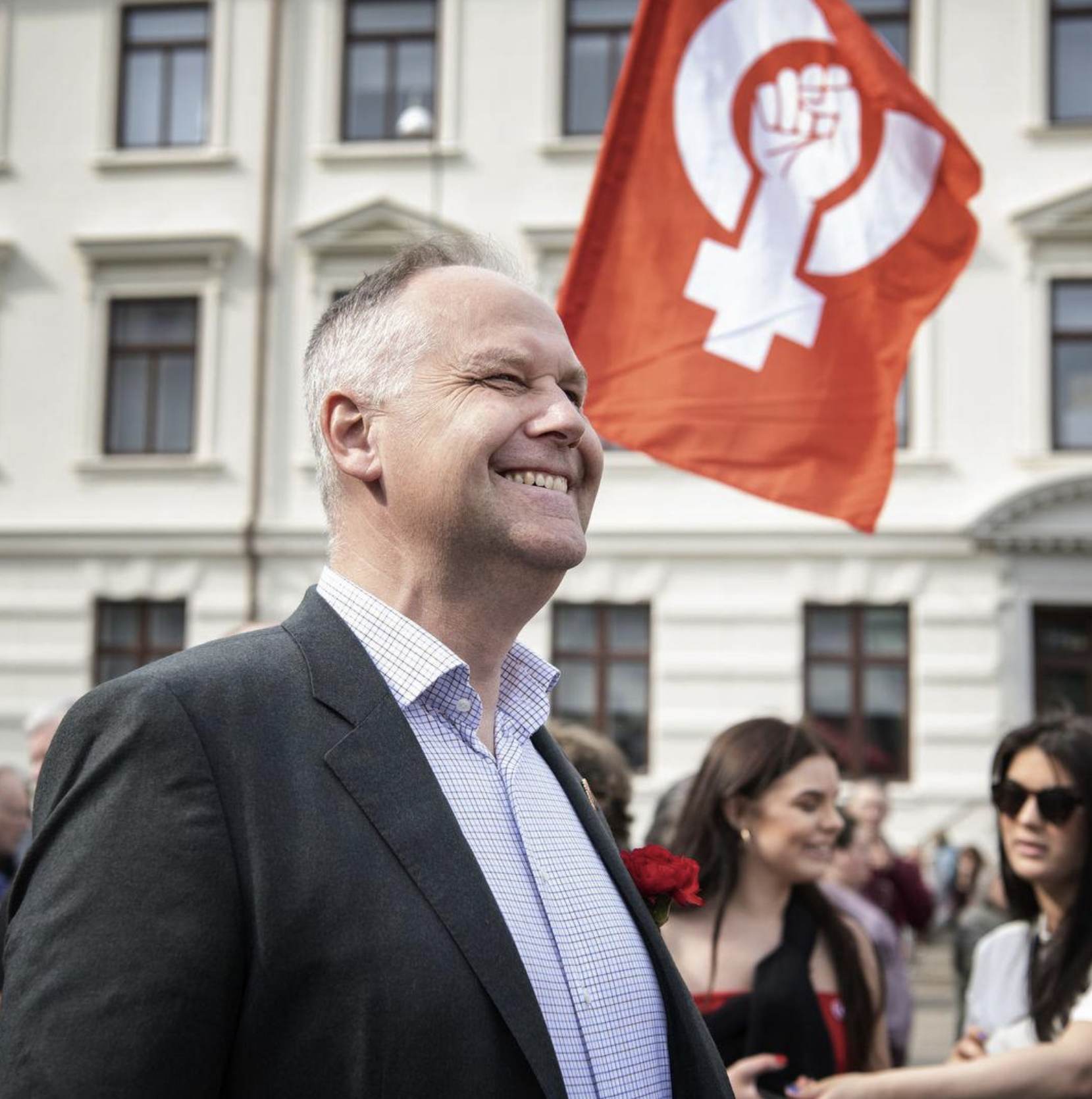
Jonas Sjöstedt
Given the growing strength of the extreme right in many European countries, including figures like Viktor Orbán, do you think that Europe will be capable of replacing the US in the worst case scenario? I would also want to concentrate on how you, Nordic left parties, are leading the fight against the Russian shadow fleet. How can we get rid of Russian fossil fuels and at the same time not incentivize other fossil fuel empires, but promote green transition? What can we do in order to both strengthen Ukraine and to strengthen progressive forces inside Europe?
I think it's very important that the left become more pro-Ukrainian and more active, because this is the natural way to grasp the political differences: Putin is a reactionary, semi fascist or fascist ruler. Orban is like a copy of Putin or trying to be his copy. So it's natural that the Left fights this.
And what was so interesting with the debate we just held in the European Parliament about the shadow fleet, is that the left was totally united. It was the driving force. We had a big majority saying that we should close this shadow fleet oil transport. But it's also a global problem. It's up to 50% of oil exported by Russia. If we were to be successful, it could have an impact. I mean, if the world stops funding this terrible war, Putin could not continue doing it. I think it's really the weak spot of Russia, and we should just press that spot as much as we could, and it's the perfect example of left wing policy in the sense that it combines solidarity with Ukraine, protecting the environment, and the maritime environment. We see there are big economical capital forces in the West that make a lot of money for the war. They import and they transport this oil, and it's extremely profitable for them. And they are also our enemy. They are actually the allies of Putin in this case. So it's a very good example of pushing the politics in support of Ukraine to a new arena.
Maybe you have some closing remarks. What would you like to add for Ukrainian readership?
I think the role of the Ukrainian left is extremely important. And I think one of our tasks is to bring people to Ukraine, to organize more trips, to organize more meetings, to try to facilitate the broader social network, because there are still some stupid arguments for not supporting Ukraine. And I think reality is the best counter argument, and you can tell about it.
Talked to Li and Jonas: Denys Pilash
Cover: Kateryna Gritseva



